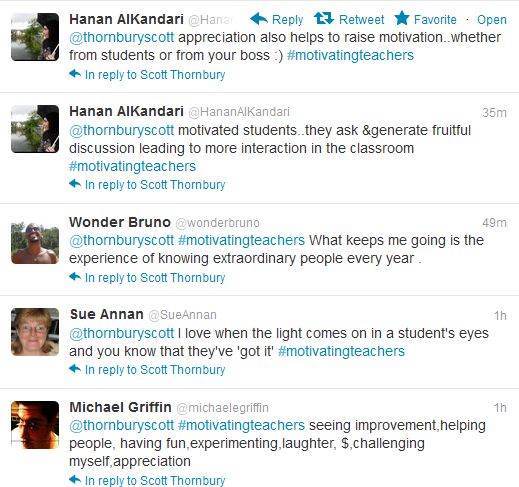On Research and Taking it Forward

I guess I’m a big picture kind of person. I like to see (and report on) major shifts and trends, and generalize these to the widest range of contexts. So I have some problems with the issue of research – not the idea, so much as the reality. It seems to me that it is difficult to reconcile the tension between wanting to prove something worthwhile, on the one hand, and, on the other, needing to train one’s lens as narrowly as possible, in order to eliminate extraneous ‘noise’, and to deliver results that will be even remotely credible.
Years ago, Peter Strevens warned that ‘perhaps the biggest single piece of self-discipline required of the individual who undertakes a programme of research is to limit his [sic] subject, to cut it down and prune it and cut it down again until it really is a single project capable of being completed in a reasonable time’. And he adds, ‘the almost universal tendency is to take on too large a subject and to become so embroiled that it is never completed, or else it becomes dangerously superficial’ (1968:27).
‘Dangerously superficial’ is my middle name! I would love, for example to demonstrate that you can learn a language in classrooms simply by using it. But to do that I will have to (1) define ‘using it’ in ways that are measurable; (2) conduct research with a wide range of learners in terms of age, nationality, first language, motivation, level, etc – and (3) for each combination have a control group that is evenly matched with the experimental classes in every particular, including the teacher. Impossible, frankly.
So, I am reduced to conducting a much smaller-scale study: for example, following just one group of learners over a relatively short period of time, and comparing the results of a post-test with a pre-test. Whatever results I get will be suggestive at best, unlikely to be significant, and easily refutable by anybody who doesn’t want to believe them.
Of course, there’s the ‘grain of sand’ argument, i.e. that a lot of small-scale studies like mine can add up to one big conclusion. This is the point of meta-analyses of the type that Norris and Ortega (2000) did, where they crunched together the results of lots of micro-studies to generate some fairly robust conclusions about the role of instructed learning. But to do a meta-analysis properly, you have to verify the tiniest details of every study, a tedious and possibly inconclusive process.
All this assumes that the point of research is to prove something. But, of course, research can be an end in itself. Like Cavafy’s ‘Ithaca’, it may be that the destination is less important than the journey. What I learn along the way, either by changing some aspect of my practice, or by scrutinizing it more closely, can only serve me in good stead. In these terms, research is simply one stage of the larger reflective cycle, without which professional development is at risk of atrophying.
However, there are some issues I would really like to see investigated, not just for the sake of the journey, but for any results, however tentative, that the research might yield. Many of them relate to the way that language emerges, particularly through interaction. And many of them overflow into one another. For example,
- What do learners learn from each other (e.g. in pair and group work) and how durable is this learning, compared to other possible sources?
- Is there evidence that memorized whole phrases (or chunks) are re-analyzed into their constituents, and thereby ‘release’ their grammar, at some point? If so, which kinds of phrases, and under what conditions?
- By the same token, what are the conditions by which isolated elements (words, phrases) are chunked into larger units that are produced and interpreted holistically? That is to say, can grammar emerge out of a kind of bricolage process?
- Is there any correlation between phase shifts (i.e. sudden leaps forward) in one system, e.g. grammar or pronunciation, and phase shifts in another (e.g. vocabulary)? And is the correlation a causal one, e.g. does the acquisition of a critical mass of vocabulary trigger changes in grammar? If so, can we put a number on it?
- Just what do learners ‘appropriate’ (if anything) from their teachers in ‘scaffolded’ conversations? Again, what does it take before these externally-sourced items become internally-regulated? I.e. how does ownership occur, and how can the teacher facilitate the process?
- How much incidental learning occurs in a language class? That is, how many words or expressions do learners pick up that weren’t necessarily targeted by the teacher? How durable is this learning, and what can be done to optimize it?
Any takers?
References:
Norris, J.M. and Ortega, L. (2000) ‘Effectiveness of L2 instruction: a research synthesis and quantitative meta-analysis’, Language Learning, 50, 417-528.
Strevens, P. (1968) ‘Linguistics and research in modern language teaching’, in Jalling, H. (ed.) Modern Language Teaching, London: Oxford University Press.





